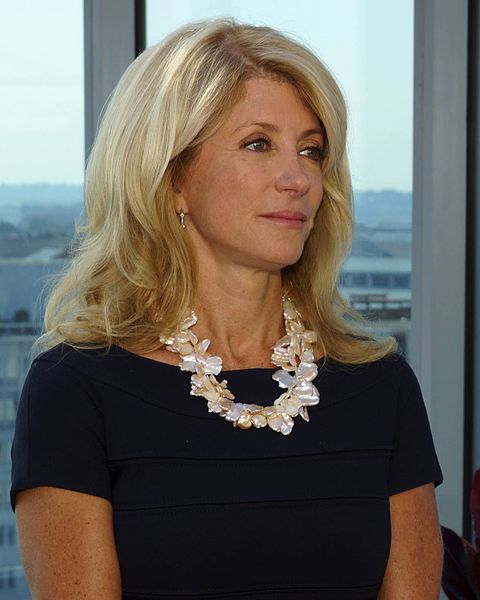In the second installment of his series analyzing the Texas political landscape, HPR staff writer David Freed assesses Wendy Davis’ political future in Texas
Perhaps Kanye West saw it coming before anyone else when he rapped in “Homecoming” about a girl named Windy, who when she met tough guys would “like to tow ‘em off/And make ‘em straighten up their hat cause she know they soft.” West’s description of a no-excuses, no-BS woman could easily fit Wendy Davis, the Texas senator who just took the state legislature by storm with her filibuster of Texas’ recently-approved twenty-week abortion ban. However, while Davis is the current poster child for the rebounding Texas Democrats, her long-term calling is probably to be the state party’s Moses: the hero needed to take the group to the promised land, but not the one to lead them in.
Davis’ story began four and a half hours away from the Capitol floor. The Fort Worth native was one of four children supported by a single mother, and as early as 14, she began to work to help provide for her family. In just five years, that family included her own daughter. At that point, Davis enrolled in community college as a teenage single mother, transferring to Texas Christian after two years and becoming the first person in her family to earn a bachelor’s degree. First in her class at TCU, Davis next set her eyes on Harvard Law, graduating with honors. She returned to her hometown as an attorney at Haynes & Boone, practicing until she was elected to the Texas Senate in 2008.
In her first two Senate terms, Davis was unafraid to challenge the dominant Republican leadership. Her most famous filibuster was not her first in the Capitol; in 2011, Davis led a crusade against the $4 billion in proposed cuts to the state’s education budget. Her rebellion did not go unnoticed. That same year, state Republicans attempted to redistrict Davis out of her seat. The senator successfully fought the measure in federal court but still only staved off Republican Mark Shelton by three points in 2012.
Davis is again up for re-election in 2014, as Texas law stipulates that in their first term after the decennial census, half the senators serve only two-year terms. With Davis up for re-election the same year as Governor Perry, the latter’s announcement that he will not seek another term has prompted speculation (and pleas) for Davis to run for statewide office. In a savvy political move, the senator has taken advantage of her new fame, meeting with future donors and party leaders in Washington as she considers her options for 2014.
For all of Davis’ heroics, she is not the right person for the 2014 gubernatorial ticket. Her pet topic, abortion, may rally liberals across the nation to pour in large sums of money for her campaign, but her filibuster is a double-edged sword. No issue rallies partisans on both sides more fiercely than abortion. A UT survey found that 62 percent of Texans oppose abortion, and the pro-life faction has taken the possibility of a Davis campaign quite seriously. Davis will not kowtow to pro-lifers in any way: the senator dismissed polls showing that a majority of women support late-terms abortion bans by contending that “a lot of people don’t really understand … what’s happening in that arena today.” Regardless of the veracity of her statement, Davis’ tendency to speak her mind on abortion does her no favors with a Texas electorate where more women than men strongly support late-term abortion bans (48 percent to 45 percent).
Davis’ potential struggles are not lost on the Republicans. Texas Republican Party Chairman Steve Munisteri has all but begged Davis to run for governor, confident both that she will lose the gubernatorial race and that the Democrats will lose the state Senate seat she now clings to by the skin of her teeth. (Under Texas law, she cannot run for both seats.) After 2010 redistricting, there are precious few Democratic seats in the Texas Senate. Increasingly restrictive voting eligibility legislation has only made these seats harder to retain. Running Davis for governor and ceding her seat to the Republicans could then be two Democratic losses in one.
Davis’ task becomes even more daunting when one considers that she would likely face a formidable opponent in Texas Attorney General Greg Abbott. He already has $20 million stashed away for a possible general election race, and the Republican machinery that propelled Perry to back-to-back-to-back victories will return in full force for Abbott. Texas Democrats are optimistic that Davis could excel among young, Hispanic and female voters, but even that advantage may not be as sizable as they think. Admittedly, all three groups tend to support liberal candidates, but it bears repeating that Davis’ pet issue will hinder, not help, her among Texas women. Meanwhile, Hispanics in Texas turn out in lower rates than almost anywhere else in the nation. Only 32 percent are currently eligible, and Jeremy Bird’s Battleground Texas will not be able to fully execute its voter turnout strategies in the 18 months before the general election.
This is not to say that Davis has no political future in Texas. Her national fame already has become a beacon of hope for Texas donors accustomed for years to sending money elsewhere. Meanwhile, in the state Senate, Davis can work on changing the culture in Texas politics and being the face of a resilient party with its eye on the Capitol. Currently, the political climate is hostile both to Democrats and, quite shockingly, to women. Less than a year ago Democratic senator Judith Zaffirini proposed reserving a breast-feeding room for staffers at the Capitol, and Republican senator Kel Sliger proposed an amendment designating her office for the purpose.
However, abortion is not the issue that Texas Democrats will eventually coalesce around when they make a concerted push to take the Capitol back from Perry, Abbott, and the rest of the Republicans. To do so, I suspect they will emphasize immigration reform. While a Wilson Perkins Allen poll found that 62 percent of Texas Hispanics describe themselves as pro-life, 80 percent of Hispanics sampled in a national Latino Decisions poll said that undocumented immigrants should have the chance to become citizens. A Democratic campaign focused on immigration reform may be especially effective given that Abbott filed a court brief in July 2010 to support Arizona’s strict immigration law.
Davis excites the party’s base and can be the face of the organization while it continues to look for a torchbearer who can appeal to the state’s moderate electorate. An extremist (for Texas) on abortion, Davis is certainly not that person. Julian Castro, whose stirring speech at the 2012 Democratic National Convention garnered national notoriety, might fit the bill, but he is also shifty on his future intentions for statewide office. Bird and Battleground Texas have given themselves a long timetable with which to work, trying to turn the state blue by 2020, and they should not mortgage their future with a Davis 2014 gubernatorial run that qualifies as a swing for the fences. Davis has helped the party take the first steps towards the Capitol, but the party would be best off placing its bets on someone else to take the final ones.
Photo Credit: Wikimedia

